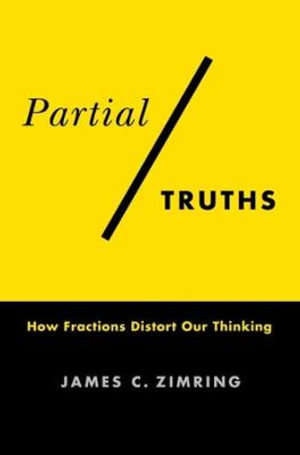A fast-food chain once tried to compete with McDonald's quarter-pounder by introducing a third-pound hamburger-only for it to flop when consumers thought a third pound was less than a quarter pound because three is less than four. Separately, a rash of suicides by teenagers who played Dungeons and Dragons caused a panic in parents and the media. They thought D&D was causing teenage suicides-when in fact teenage D&D players died by suicide at a much lower rate than the national average. Errors of this type can be found from antiquity to the present, from the Peloponnesian War to the COVID-19 pandemic. How and why do we keep falling into these traps?
James C. Zimring argues that many of the mistakes that the human mind consistently makes boil down to misperceiving fractions. We see slews of statistics that are essentially fractions, such as percentages, probabilities, frequencies, and rates, and we tend to misinterpret them. Sometimes bad actors manipulate us by cherry-picking data or distorting how information is presented; other times, sloppy communicators inadvertently mislead us. In many cases, we fool ourselves and have only our own minds to blame. Zimring also explores the counterintuitive reason that these flaws might benefit us, demonstrating that individual error can be highly advantageous to problem solving by groups. Blending key scientific research in cognitive psychology with accessible real-life examples, Partial Truths helps readers spot the fallacies lurking in everyday information, from politics to the criminal justice system, from religion to science, from business strategies to New Age culture.
About the Author
James C. Zimring is the Thomas W. Tillack Professor of Experimental Pathology at the University of Virginia School of Medicine. He is the author of What Science Is and How It Really Works (2019).
Industry Reviews
In this brilliant follow up to What Science Is and How It Really Works, James Zimring engages the reader in a kind of detective story about the classic mistakes of human reasoning, due to our innumeracy. From bad social policy to pandemics to terrorism, he shows how human decision making often gets it so wrong. What I loved most about Partial Truths though is that he didn't just establish that we make errors, but why. This amounts to a handy, insightful, eminently readable guide to the intricate evolution of the human mind itself. If you enjoyed Daniel Kahneman's Thinking, Fast and Slow, you'll love this book. -- Lee McIntyre, author of How to Talk to a Science Denier: Conversations with Flat Earthers, Climate Deniers, and Others Who Defy Reason
Using the simple notion of a fraction as a lens, James Zimring insightfully discusses a remarkable variety of issues from cognitive psychology to New Age beliefs to misunderstandings in politics. Thoughtful and wide-ranging. -- John Allen Paulos, Temple University, and author of A Mathematician Reads the Newspaper and Innumeracy
In Partial Truths, Zimring offers an entertaining and illuminating look at how we all misunderstand-and how the media and politicians misrepresent, and even scientists sometimes distort-the numbers and data that underlie so much of our conventional wisdom. -- David Zweig, author of Invisibles: The Power of Anonymous Work in an Age of Relentless Self-Promotion
Zimring's book Partial Truths takes a walk through the various ways human cognition fails when dealing with numbers, probabilities, risk, and assessing evidence. Along the way, Zimring takes us through a bestiary of fascinating case studies both historical and modern. His clear prose illuminates the ways that politicians take advantage of our cognitive shortcomings, the ways that numbers mislead us in everyday life, and what this means for important social topics like racialized criminal justice, war mongering, and public belief in science. While Zimring follows previous authors in advocating for improved information literacy, he takes a more measured approach. Zimring is admirably aware of the ways that human cognition is hard to change, and recognizes that sometimes our reasoning biases actually benefit us, even as he helps the reader see these biases more clearly. A great book for those grappling with the confusion of our modern information environments. -- Cailin O'Connor, author of The Misinformation Age: How False Beliefs Spread
Numbers become far more than abstractions in the capable hands of James Zimring. I learned something fascinating and enlightening on nearly every page of Partial Truths- - about politics, social policy, economics, cultural choices, criminal justice, and much more. -- Steven Lubet, author of Interrogating Ethnography: Why Evidence Matters
Zimring does a great job breaking down complex theories of statistics and mathematical equations into relatable stories and examples. His perception... is fascinating. * AIPT *
Partial Truths is a book to read through very carefully and then keep next to your desk. . . . Let's all keep help like [this] close at hand at least until the next time our prejudices are about to make us decide wrongly or vote stupidly. * Forbes *
As mathematics (or mathematics adjacent) treatises go Partial Truths is as reader-friendly and interesting as they come. * Brain Drain Blog *
The book is easy to read, has entertaining examples, and no math is required. This book should be required reading for all. * Choice *
Blending key scientific research in cognitive psychology with accessible real-life examples, Partial Truths helps readers spot the fallacies lurking in everyday information, from politics to the criminal justice system, from religion to science, from business strategies to New Age culture. * zbMath *

























